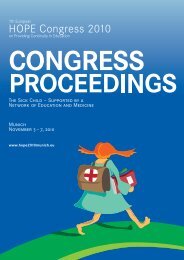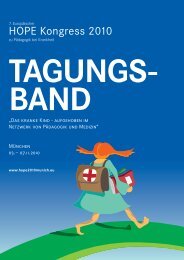HOPE Kongress 2010 - Hope Congress Munich 2010
HOPE Kongress 2010 - Hope Congress Munich 2010
HOPE Kongress 2010 - Hope Congress Munich 2010
Sie wollen auch ein ePaper? Erhöhen Sie die Reichweite Ihrer Titel.
YUMPU macht aus Druck-PDFs automatisch weboptimierte ePaper, die Google liebt.
7th European <strong>HOPE</strong> <strong>Congress</strong> <strong>2010</strong><br />
• gibt am Ende Feedback zur Prozessdynamik.<br />
2. Ablaufschema KTC (60 Minuten)<br />
10<br />
5<br />
10<br />
5<br />
10<br />
15<br />
5<br />
Präsentation des<br />
Anliegens (Bericht,<br />
Darstellung durch den<br />
Akteur)<br />
Klärende Rückfragen<br />
Konferenz der Coaches<br />
Formulieren des<br />
Schlüsselthemas<br />
Ideenwerkstatt /<br />
Lösungsbrainstorming<br />
Prozessreflexion<br />
(Prozessbeobachter<br />
berichtet)<br />
Feedback des Akteurs<br />
3. Arbeitsschritte im KTC<br />
• Akteur präsentiert sein Szenario, die Gruppe fragt nach (keine<br />
Interpretationen oder suggestive Fragen!)<br />
• Konferenz der Coaches (Akteur sitzt außerhalb der Gruppe, hört zu!)<br />
Coaches sammeln Eindrücke, Assoziationen, Phantasien, Gedanken,<br />
Gefühle<br />
• Coaches stellen evtl. Klärungsfragen an Akteur.<br />
• Coaches entwickeln das Schlüsselthema<br />
• Ideenwerkstatt: Die Coaches sammeln Ideen im Brainstorming<br />
• Feedback des Prozessbeobachters<br />
• Akteur entwickelt seine persönliche Maßnahme<br />
3.1. Das Schlüsselthema<br />
• gibt die zentrale Entwicklungsrichtung für den Akteur an<br />
• ist der Hebel für eine gezielte Veränderung der Person und ihres Systems<br />
• ist mit einer Vision verbunden<br />
• ist positiv, pointiert, entwicklungsorientiert und erreichbar, ermutigend<br />
und herausfordernd, knapp und treffend<br />
• hat oft eine metaphorische Aussage<br />
• wird in der Ideenwerkstatt durch Konkretisieren näher ausgeführt<br />
4. KTC-Zyklus als Raumfolge<br />
• Unmittelbare Wahrnehmung der Situation – Problemraum “Entdeckung<br />
des Neuen“, „Unsicherheit und Faszination“<br />
• Resonanzraum<br />
Die Coaches spiegeln Eindrücke, Gefühle, Gedanken, Bilder<br />
• Lösungsraum<br />
Entwickeln eines Schlüsselthemas<br />
Sammeln von Entwicklungsideen<br />
Definieren der Maßnahmen<br />
• Handlungsraum<br />
Praxisphase: Versuch & Irrtum, Entwicklung einer neuen Situation<br />
Kollegiales Team Coaching – KTC<br />
nach: Prof. Dr. Wilfried Schley, Universität Zürich<br />
Prof. Dr. Michael Schratz, Universität Innsbruck<br />
Cooperation between hospital teachers and home school teachers.<br />
Grete Buck Aulin<br />
Hospital Teacher and Marte Meo Pedagogue. SWEDEN<br />
The background for my work with home school teachers<br />
I am a hospital teacher in a psychiatric consultation for Children and<br />
Youth, called BUP, in Sweden. The following is a common problem for<br />
school staff that asks for consultation.<br />
Teachers complain about students having disturbing behavior at school,<br />
feeling that these students don’t want to work and that they are lazy. That<br />
might be true for some children who have reached the age where they find<br />
III. Workshops und Foren<br />
83<br />
other friends they want to be with and other activities they want to do. But<br />
some children not only disturb the lessons at school, they have problems<br />
in the playground as well. The other children refuse to let them join in their<br />
play because they know that these children will even destroy their games<br />
as well as the lessons.<br />
Skills children need to succeed in life<br />
A six year old child who wants to play with other children, must be able to<br />
be socially attentive in following the initiatives of other children. The child<br />
has to name his own initiatives and to be able to take turns. He has to<br />
have social behavioural models as well as adequate cooperation skills and<br />
he has to be able to concentrate. These skills and also other skills such<br />
as solving problems and sufficient language to express himself as well as<br />
having ideas for playing and working, are necessary in order to make good<br />
connections with others. There are some children that don’t have these<br />
skills and they all get behavioural problems at school. This behaviour also<br />
affects the learning situation for the child.<br />
We all want to join the group, the society in which we live. And we all want<br />
to learn to be a part of the society. The children who don’t know how<br />
to behave together with their peers have difficulties in many situations<br />
and are at risk for psychiatric disorders. In other words the child with<br />
developmental problems in basic communication skills needs support in<br />
order to continue developing well.<br />
The Marte Meo Method<br />
As a Marte Meo pedagogue as well as a hospital teacher, I can help these<br />
children in their own environment, at school. The Marte Meo method<br />
helps the school staff to understand the child and support the child in his<br />
development.<br />
I take up a five to ten minute film session in order to analyse the interaction<br />
between student and teacher. After each film session I have a<br />
review session. The use of the video camera allows the teacher to view<br />
the child step by step in a way that’s impossible in real life. In the view<br />
session I give the teacher “homework” in supporting communication using<br />
the Marte Meo Principles. You can read more about the method at http://<br />
www.martemeo.com/site/index.cfm.<br />
My workshop<br />
In my work-shop, I will show you some films from my work in school. We<br />
are going to follow two or three boys that have gone through the Marte<br />
Meo Programme. I will tell you a little about each child and his back ground<br />
at home and also his school history. Using the film sequences, I can show<br />
you how the child interacts with others and what he needs to work on in<br />
order to continue to develop well.<br />
I have taken several films of the boys in order to give review sessions<br />
showing the school staff how to continue working with the Marte Meo<br />
principles. I will show you some of the sessions so that you can see and<br />
follow the work the school staff has done. The best part of filming is that<br />
it makes it possible to stop time, to look step by step at what’s going on<br />
in the interaction. That makes it possible for you to be able to see film<br />
sequences where the child is developing his connecting skills.<br />
The child’s development<br />
The child’s needs and stage of development is in focus in stead of the age of<br />
the child. The adult can support the child who can have different problems<br />
such as language difficulties, autism, ADHD and conduct disorders. The<br />
question is not why the child does not have the skills, but how to help the<br />
child to develop his connection skills.<br />
The teachers’ development<br />
It is nice also to follow the development of the school staff. Their skills are<br />
increasing and they have a more professional way of interacting with the<br />
child after they have been working with Marte Meo. The teachers change<br />
the interpretation of the child’s behaviour from “he disturbs and is lazy” to<br />
“today he looked at me when I named his initiatives and he realized what he<br />
had to do!” The teachers go from been a victim of the child’s behaviour to<br />
being the professional leader of the action in the classroom.<br />
The teachers in my films have different education. You will be able to follow<br />
teachers who have been unaware how they react on the child’s initiatives<br />
to connect. They also realize that it is important to approach and handle<br />
situations with a different perspective and less negative actions.<br />
In my films I have other teachers who work in a special school for children












